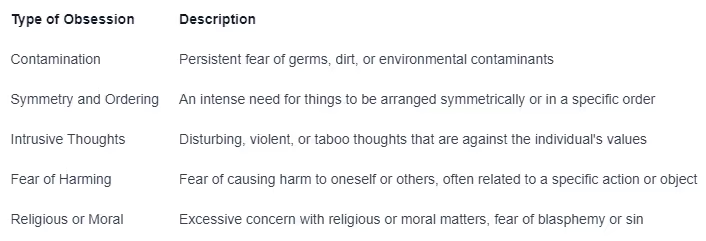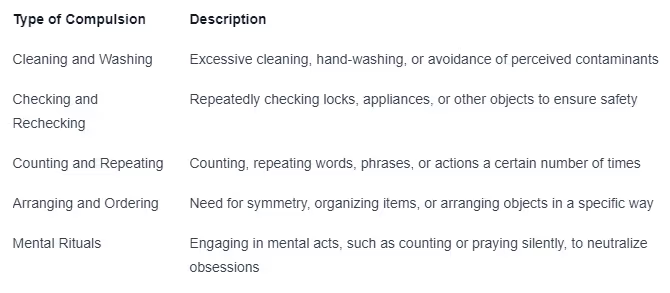Obsessive-Compulsive Disorder (OCD) - Symptoms and Causes

Understanding Obsessive-Compulsive Disorder (OCD)
Obsessive-Compulsive Disorder (OCD) is a mental health condition characterized by recurring, unwanted thoughts (obsessions) and repetitive behaviors (compulsions). It is a complex disorder that can significantly impact a person's daily life and well-being. In this section, we will explore what OCD is and the prevalence and impact it has on individuals.
What is OCD?
OCD is a chronic psychiatric disorder that affects people of all ages, genders, and backgrounds. It is estimated that approximately 2.3% of the global population will experience OCD at some point in their lives. The disorder typically starts during childhood, adolescence, or early adulthood and tends to persist if left untreated.
Individuals with OCD experience intrusive thoughts or images that cause anxiety and distress. These obsessions are often irrational and unrealistic, but they feel uncontrollable to the person experiencing them. In an attempt to alleviate the anxiety caused by these obsessions, individuals engage in repetitive behaviors or mental rituals known as compulsions.
It's important to note that OCD is different from everyday worries or habits. The obsessions and compulsions in OCD are time-consuming, interfere with daily functioning, and cause significant distress. If you suspect that you or someone you know may be experiencing OCD symptoms, it is essential to seek professional help for an accurate diagnosis and appropriate treatment.
Prevalence and Impact of OCD
OCD is more common than many people realize. It affects people of all races, ethnicities, and socioeconomic backgrounds. According to the World Health Organization (WHO), OCD is ranked as one of the top 20 causes of illness-related disability worldwide for individuals aged 15-44.
The impact of OCD can be far-reaching. It affects not only the individual with the disorder but also their family, friends, and overall quality of life. The obsessions and compulsions can significantly interfere with daily activities, such as work, school, and relationships. The distress caused by OCD can lead to feelings of guilt, shame, and isolation.
It is crucial to understand that OCD is a treatable condition. With the right diagnosis, therapy, and support, individuals with OCD can manage their symptoms and lead fulfilling lives. If you or someone you know is struggling with OCD, it is recommended to consult a mental health professional for a comprehensive evaluation and guidance on available treatment options.
In the next section, we will explore the common symptoms of OCD, including the different types of obsessions and compulsions that individuals may experience.
Common Symptoms of OCD
Obsessive-Compulsive Disorder (OCD) is a complex mental health condition characterized by the presence of obsessions and compulsions. These symptoms can significantly impact a person's daily life, causing distress and interfering with their ability to function normally. Understanding the common symptoms of OCD is crucial in recognizing and seeking appropriate help.
Obsessions and Compulsions
OCD is characterized by the presence of obsessions and compulsions, which are two distinct components of the disorder. Obsessions are intrusive and unwanted thoughts, images, or urges that repeatedly enter a person's mind. These obsessions are often distressing and difficult to control. On the other hand, compulsions are repetitive behaviors or mental acts that individuals feel driven to perform in response to their obsessions. These compulsions are often carried out as an attempt to alleviate anxiety or prevent a feared outcome.
Types of Obsessions
Obsessions can manifest in various forms, and the content may vary from person to person. Here are some common types of obsessions experienced by individuals with OCD:

Types of Compulsions
Compulsions are repetitive behaviors or mental acts performed in response to obsessions, with the aim of reducing distress or preventing a feared outcome. Here are some common types of compulsions associated with OCD:

It's important to note that individuals with OCD may experience a combination of obsessions and compulsions, and the severity of symptoms can vary greatly. If you or someone you know is experiencing symptoms of OCD, it's essential to seek professional help for accurate diagnosis and appropriate treatment options.
The Maze of OCD Symptoms
Obsessive-Compulsive Disorder (OCD) is a complex mental health condition characterized by the presence of obsessions and compulsions. These symptoms can manifest in various ways, creating a maze-like experience for individuals with OCD. Let's explore some of the common manifestations of OCD symptoms:
Contamination and Cleaning
One of the most well-known manifestations of OCD is the fear of contamination and the subsequent need for cleaning and sanitization. Individuals with this symptom often have intrusive thoughts about germs, dirt, or harmful substances. As a result, they may engage in excessive cleaning rituals and avoid situations or objects they perceive as contaminated. These behaviors can interfere with daily life and cause distress.
Checking and Rechecking
Another common symptom of OCD is the need to check and recheck things repeatedly. This can involve checking locks, appliances, or personal belongings to ensure they are secure or in the right order. Individuals with this symptom often experience intense doubt and anxiety, leading them to engage in compulsive behaviors to alleviate their fears. However, this checking behavior can become time-consuming and may disrupt daily routines.
Symmetry and Ordering
Some individuals with OCD experience a strong need for symmetry, exactness, and orderliness. They may feel an overwhelming urge to arrange objects or perform actions in a specific way to achieve a sense of balance or perfection. These individuals may spend significant amounts of time arranging items or engaging in repetitive behaviors until they feel a sense of satisfaction. Deviation from their desired symmetry or order can cause distress and anxiety.
Intrusive Thoughts and Mental Rituals
Intrusive thoughts are distressing and unwanted thoughts that occur repetitively and involuntarily. Individuals with OCD may experience intrusive thoughts that are often irrational, disturbing, or violent in nature. These thoughts can be distressing and lead to the development of mental rituals or repetitive mental acts to neutralize or counteract the anxiety caused by the thoughts. Mental rituals can include silently repeating words or phrases, counting, or praying.
Understanding the various manifestations of OCD symptoms is essential in recognizing the condition and seeking appropriate help. If you or someone you know is experiencing these symptoms, it is important to consult a healthcare professional for an accurate diagnosis and to explore treatment options. In our next section, we will delve into the impact of OCD symptoms on daily life, including emotional effects and relationship implications.
Impact on Daily Life
Living with obsessive-compulsive disorder (OCD) can significantly impact various aspects of daily life. The symptoms associated with OCD can interfere with day-to-day activities, have emotional and psychological effects, and create challenges in relationships and social interactions.
How OCD Symptoms Interfere with Daily Activities
OCD symptoms can consume a significant amount of time and energy, making it difficult for individuals to focus on other tasks and responsibilities. Engaging in compulsions or rituals to alleviate anxiety or distress can be time-consuming and may disrupt regular routines. This can lead to difficulties in meeting work or academic deadlines, household chores, or personal commitments.
To better understand the impact of OCD symptoms, consider the following examples:

Emotional and Psychological Effects of OCD
The relentless obsessions and compulsions associated with OCD can take a toll on emotional well-being. Individuals with OCD often experience high levels of anxiety, stress, and frustration. The constant presence of intrusive thoughts and the pressure to perform compulsions can lead to feelings of guilt, shame, and inadequacy. Over time, these emotional and psychological effects can contribute to a decreased quality of life and impact overall mental health.
Relationship and Social Implications
OCD can also have significant effects on relationships and social interactions. The symptoms of OCD, such as excessive handwashing, checking, or the need for symmetry, can be difficult for others to understand or accommodate. This may result in strained relationships, conflicts, or feelings of isolation. Individuals with OCD may avoid social situations or have difficulty maintaining friendships due to the fear of being judged or misunderstood.
It is important to recognize that OCD is a treatable condition, and seeking help can make a significant difference in managing the impact it has on daily life. Understanding the challenges that OCD presents in various aspects of life can help individuals and their loved ones navigate through these difficulties and seek appropriate support.
If you suspect that you or someone you know may be experiencing symptoms of OCD, it is recommended to consult a healthcare professional for an accurate diagnosis and explore suitable treatment options.
Seeking Help and Treatment Options
When it comes to managing obsessive-compulsive disorder (OCD), seeking professional help and exploring treatment options is essential. The following are some avenues to consider for diagnosis and treatment of OCD.
Diagnosis of OCD
To receive an accurate diagnosis of OCD, it is crucial to consult with a qualified mental health professional, such as a psychiatrist or psychologist. The diagnostic process typically involves a comprehensive assessment of symptoms, medical history, and a psychological evaluation.
During the evaluation, the healthcare provider will inquire about the specific obsessions and compulsions experienced, as well as their impact on daily life. They may also conduct interviews, questionnaires, and other assessments to gather additional information. It is essential to be open and honest during this process to ensure an accurate diagnosis.
Therapy and Counseling for OCD
Therapy and counseling play a vital role in the treatment of OCD. Cognitive-behavioral therapy (CBT) is considered the gold standard in OCD treatment. Specifically, a type of CBT called exposure and response prevention (ERP) is highly effective.
ERP involves gradually exposing individuals to their obsessive thoughts while refraining from engaging in the associated compulsive behaviors. Through this process, individuals learn to tolerate anxiety and break the cycle of obsessions and compulsions. The therapy also helps individuals develop healthier coping strategies and manage any underlying anxiety or stress.
In addition to ERP, therapy may also involve other techniques, such as cognitive restructuring and mindfulness-based approaches. The duration and frequency of therapy sessions may vary depending on individual needs and progress.
Medication Options for OCD
Medication can be a valuable component of OCD treatment, particularly for individuals with moderate to severe symptoms. Selective serotonin reuptake inhibitors (SSRIs) are commonly prescribed as the first-line pharmacological treatment for OCD.
SSRIs work by increasing the availability of serotonin in the brain, which helps regulate mood and reduce obsessive thoughts and compulsive behaviors. It is important to note that medication should be prescribed and monitored by a qualified healthcare professional, typically a psychiatrist.
While medication can be effective in managing OCD symptoms, it is often used in conjunction with therapy for optimal results. The healthcare provider will determine the appropriate medication, dosage, and duration based on individual needs and response.
Remember, seeking help and exploring treatment options are essential steps in managing OCD symptoms. A comprehensive approach that combines therapy and, if necessary, medication can provide significant relief and improve the overall quality of life for individuals with OCD.
Conclusion
In conclusion, obsessive-compulsive disorder (OCD) can have a significant impact on the lives of those who experience it. The constant presence of obsessions and compulsions can interfere with daily activities, create emotional and psychological distress, and strain relationships. However, it is essential to recognize that OCD is a treatable condition.
Seeking professional help and exploring treatment options such as therapy and medication can provide significant relief and improve the quality of life for individuals with OCD. By understanding the various manifestations of OCD symptoms and their impact on daily life, we can increase awareness, reduce stigma, and promote effective treatment strategies for those living with this challenging condition.
